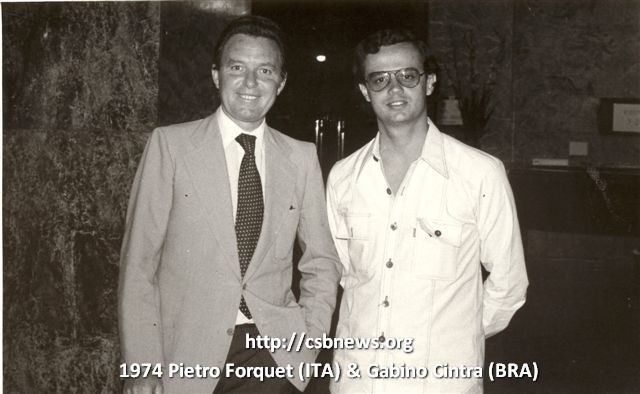Source: BDI Bridge de Italia 1999
«God is Italian» with this words complained Edgar Kaplan about a couple of miraculous contracts completed by the Blue Team during the final of a world championship. And this hand played during the last Pairs MEC championship would seem to give the reason to the famous American expert.
Suppose you are in West, in the same position as the Junior player Riccardo Intonti:
![]() Q 10 5
Q 10 5 ![]() A K Q 5
A K Q 5 ![]() A
A ![]() A Q J 8 4
A Q J 8 4
North and East Pass. South opens 2![]() weak, You double, North pass, East bids 3
weak, You double, North pass, East bids 3![]() semi-positive (Lebenshol) and South pass.
semi-positive (Lebenshol) and South pass.
Is your turn, what do you say?
Probably by now you do not see any downside, you can say 4![]() , forcing, or a false cue-bid with 3
, forcing, or a false cue-bid with 3![]() if you think your partner might not consider forcing the 4
if you think your partner might not consider forcing the 4![]() . Suppose instead that as Intonti you decide to declare 3
. Suppose instead that as Intonti you decide to declare 3![]() trying to make an advance cue bid. The bidding continues this way:
trying to make an advance cue bid. The bidding continues this way:
| West | North | East | South |
| Intonti | Lund | Biondo | Brondeim |
| Pass | Pass | 2 |
|
| Doblo | Pass | 3 |
Pass |
| 3 |
Pass | 4 |
Pass |
| 4 |
Pass | 4 |
Pass |
| 6 |
Pass | 6 |
Pass |
| ? |
* weak
It’s up to YOU again and this time the situation is dramatic, East, not surprisingly has interpreted as natural your 3![]() . But…you wonder, the jump to 6
. But…you wonder, the jump to 6![]() couldnt generate him any doubts?
couldnt generate him any doubts?
What is your bid?
Doubting greatly between 6![]() and 6NT you finally decide for the second one, expecting the 4
and 6NT you finally decide for the second one, expecting the 4![]() cue-bid to be an honour. After two pass, South doubles, North following the dictates of Mr. Lowenthal does not attack with his partner’s suit, he initiates the play with a diamond, «God is Italian!» .
cue-bid to be an honour. After two pass, South doubles, North following the dictates of Mr. Lowenthal does not attack with his partner’s suit, he initiates the play with a diamond, «God is Italian!» .
Biondo shows his cards.
|
This time the double wasnt a regular Lowenthal1.
South had not doubled 4![]() to not give more bidding space to the opponents. Now he feared that the lack of double could be interpreted as an invitation not to attack the spades, he decided to double 6NT to cancel the unwanted previous message.
to not give more bidding space to the opponents. Now he feared that the lack of double could be interpreted as an invitation not to attack the spades, he decided to double 6NT to cancel the unwanted previous message.
Well, miraculously the lead was not a spade but you only have 10 tricks. However, they become 11 when you play your three heart honours and all the players follow the suit.
How do you continue to try to find the twelfth trick?
This is the whole hand:
|
Intonti pitched a diamond in the fourth heart and continued with four club rounds, arriving to this four cards end:
|

When he played the ![]() 10 South was helpless: if he throughs the
10 South was helpless: if he throughs the ![]() K, declarer plays spade to his
K, declarer plays spade to his ![]() A, if he throughs a diamond, declarer diamonds are good…ABSOLUTE TOP.
A, if he throughs a diamond, declarer diamonds are good…ABSOLUTE TOP.
In other of the tournament tables the same hand was played by Dano De Falco and Giovanna Genova (at the end they finished in the second place), the bidding was:
| West | North | East | South |
| De Falco | Kendrick | Genova | Senior |
| Pass | Pass | 1 |
|
| Doblo | 3 |
doblo* | Pass |
| 4 |
Pass | 5 |
Pass |
| 6 |
Pass | Pass | Pass |
* take out
North’s intervention lead the Italians to a lousy slam. With her double Genova had wanted to show Dano generic values, but De Falco believing that it showed 4 heart cards and considering it was a pairs tournament, declared the slam in heart, sure to find a singleton spade in his partners hand.
He found the spade singleton, but only three hearts.
But «God is Italian» the hearts were 3-3, which allowed Dano to easily make his contract. AN ABSOLUTE VICE-TOP!
CsbNews Editor Note:
1 stripe-tailed ape double: (The term is attributed to the late John Lowenthal.)
In the days of yore when the scoring methods of the game of bridge was evolving a certain Mr. Sam Scaffidi in cooperation, collaboration and possible conspiracy with Mr. John Lowenthal discovered that if the opponents doubled at the five level when the other two players were definitely heading towards a makeable slam contract, then the slam bidders might possibly consider playing at the five level doubled. The term is attributed to the late John Lowenthal. According to his story, a visitor to the Amazon jungle met a group of bridge-playing natives who employed a strategy of doubling opponents who were in the process of bidding a makeable slam. When the visitor asked what happened if the opponents were clever enough to redouble, the natives replied, “Oh, then we run like a stripe-tailed ape.” (Source: BridgeGuys + Karen Walker)
